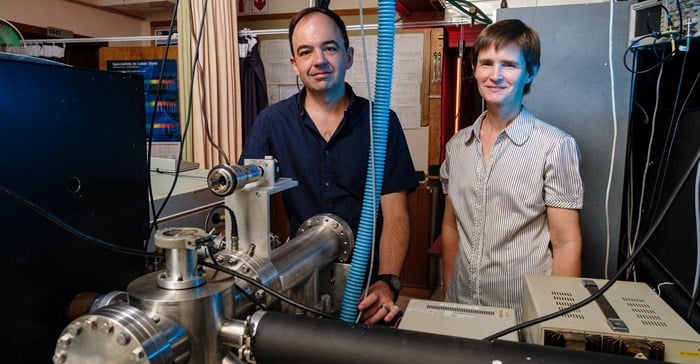Stellenbosch University (SU) and high-tech company Enlightened Isotopes, a subsidiary of ASP Isotopes, have entered into a research partnership worth R8.5m to develop a protocol for the separation of the ytterbium-176 isotope to be used as a radiopharmaceutical in cancer therapy.

Source: Stefan Els. Pieter Neethling and Christine Steenkamp in the high resolution laser spectroscopy laboratory in the Department of Physics at Stellenbosch University.
Worldwide, isotope producing companies are looking for alternative technologies because traditional sources - mostly nuclear reactors - are coming to the end of their life cycles. At present, Russia and China are the world’s largest suppliers of isotopes.
Christine Steenkamp, a laser physicist in SU’s department of physics, has been investigating the use of laser-based resonance ionisation as a technique to purify atomic isotopes for medical use since 2015. She is doing research in the field of resonance ionisation spectroscopy – an extremely sensitive and highly selective analytical measurement method to detect individual atoms and molecules.
Steenkamp and her team have already successfully applied the technique to zinc isotopes, as the production of pure zinc-68 is important for the production of gallium-68 (used in medical PET diagnostic scans).
She says the project will consist of two phases: “During the first phase we will use our existing equipment and experimental setup to study and understand this specific isotope of ytterbium. This will give us a better understanding of the experimental setup required to control and separate the isotope on commercial scale from the material in which it occurs naturally.”
Ytterbium is a rare earth chemical element (Yb) that occurs naturally in ores. One of its seven isotopes, ytterbium-176, can easily be transmuted into radioactive lutetium-177, used primarily in the treatment of prostate cancer.
In nuclear medicine, isotopes that release low levels of radiation are used to target cancer cells. Because body tissues affected by cancer have increased cell activity, the cancer cells will absorb more of the radioactive isotope. In this way, the cancer cells are targeted.
South Africa's isotope advancement
Therapeutic isotopes are, however, very expensive and can cost tens of thousands of dollars per gram. And because these isotopes remain radioactive for only a short period of time, they need to be produced close to hospitals.
Pieter Neethling, director of the Stellenbosch Photonics Institute at SU and co-investigator on the project, says high levels of expertise and specialised equipment are prerequisite to the development of such a protocol: “We are extremely excited to be able to contribute to the development of such a high-tech isotope enrichment facility in South Africa.”
Josua Oosthuizen, project manager at Enlightened Isotopes and ASP Isotopes, says they are looking forward to working with a world-class team at Stellenbosch University: “Although the work is currently focused on Yb-176, we have a long pipeline of medical isotopes that in future will be developed in partnership with the SU team.”




















































